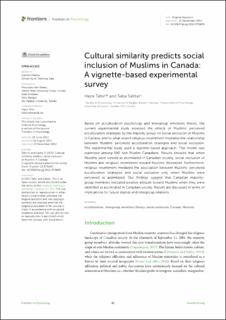| dc.contributor.author | Tahir, Hajra | |
| dc.contributor.author | Safdar, Saba | |
| dc.date.accessioned | 2023-02-15T09:10:53Z | |
| dc.date.available | 2023-02-15T09:10:53Z | |
| dc.date.created | 2022-12-19T08:19:27Z | |
| dc.date.issued | 2022 | |
| dc.identifier.issn | 1664-1078 | |
| dc.identifier.uri | https://hdl.handle.net/11250/3050952 | |
| dc.description.abstract | Based on acculturation psychology and intergroup emotions theory, the current experimental study assessed the effects of Muslims’ perceived acculturation strategies by the majority group on social exclusion of Muslims in Canada, and to what extent religious resentment mediated the relationship between Muslims’ perceived acculturation strategies and social exclusion. The experimental study used a vignette-based approach. This model was examined among 190 non-Muslim Canadians. Results showed that when Muslims were viewed as assimilated in Canadian society, social exclusion of Muslims and religious resentment toward Muslims decreased. Furthermore, religious resentment mediated the association between Muslims’ perceived acculturation strategies and social exclusion only when Muslims were perceived as assimilated. Our findings suggest that Canadian majority-group members indicated positive attitude toward Muslims when they were identified as assimilated in Canadian society. Results are discussed in terms of implications for future studies and intergroup relations. | en_US |
| dc.language.iso | eng | en_US |
| dc.publisher | Frontiers | en_US |
| dc.rights | Navngivelse 4.0 Internasjonal | * |
| dc.rights.uri | http://creativecommons.org/licenses/by/4.0/deed.no | * |
| dc.title | Cultural similarity predicts social inclusion of Muslims in Canada: A vignette-based experimental survey | en_US |
| dc.type | Journal article | en_US |
| dc.type | Peer reviewed | en_US |
| dc.description.version | publishedVersion | en_US |
| dc.rights.holder | Copyright 2022 The Author(s) | en_US |
| dc.source.articlenumber | 973603 | en_US |
| cristin.ispublished | true | |
| cristin.fulltext | original | |
| cristin.qualitycode | 1 | |
| dc.identifier.doi | 10.3389/fpsyg.2022.973603 | |
| dc.identifier.cristin | 2094901 | |
| dc.source.journal | Frontiers in Psychology | en_US |
| dc.identifier.citation | Frontiers in Psychology. 2022, 13, 973603. | en_US |
| dc.source.volume | 13 | en_US |

